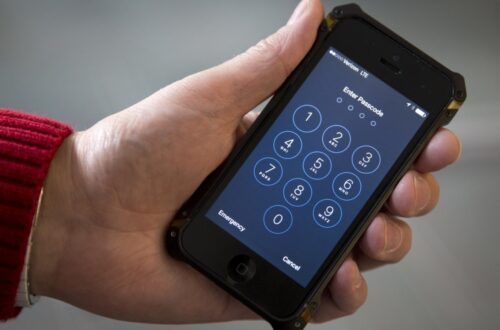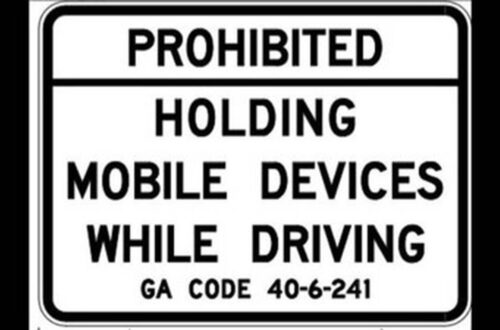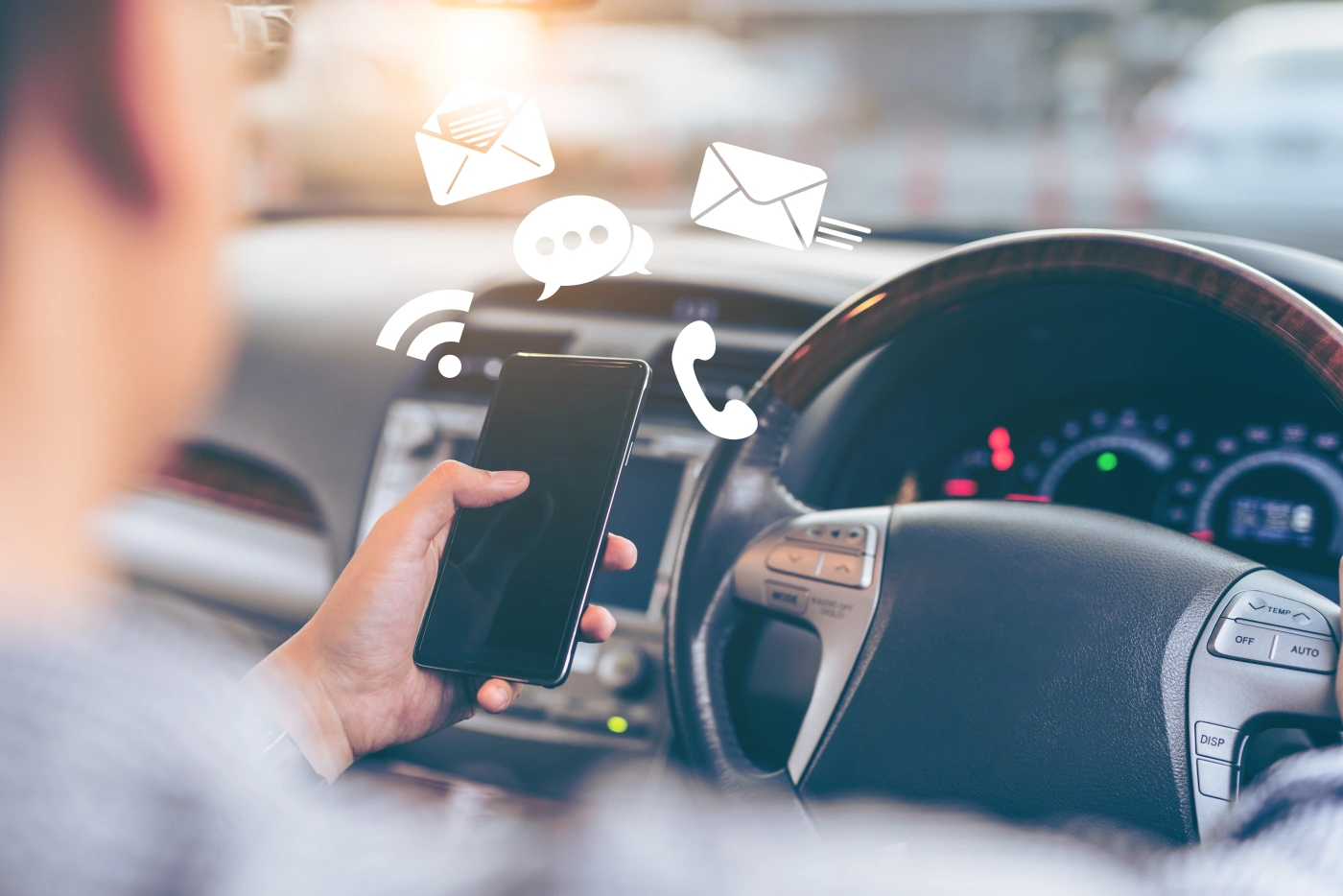Texting while driving significantly raises your risk of accidents, with drivers being 23 times more likely to crash while texting. The consequences are severe, causing around 1.6 million accidents annually in the US alone and leading to approximately 390,000 injuries each year. Taking your eyes off the road for just 5 seconds while texting at 55 mph is akin to blindly traversing a football field's length. Understanding these dangers and keeping your focus on driving is vital for road safety, especially when it comes to avoiding the devastating impact of texting-related accidents.
Texting While Driving Statistics
Texting while driving greatly heightens the risk of accidents. Statistics show that drivers are 23 times more likely to crash when texting behind the wheel. This alarming figure highlights the critical consequences of such a seemingly harmless act. In fact, in the United States alone, approximately 1.6 million accidents per year are caused by texting while driving. These accidents result in around 390,000 injuries annually.
Moreover, studies reveal that taking your eyes off the road for just five seconds when texting at 55 miles per hour is equivalent to driving the length of a football field blindfolded. This shocking comparison underscores the significant impairment texting can have on your ability to safely operate a vehicle. Despite the known risks, a concerning number of drivers still engage in this risky behavior. It is essential to raise awareness about the dangers of texting while driving and to emphasize the importance of staying focused on the road to prevent unnecessary accidents and injuries.
Cognitive Distractions Impact on Driving
Understanding the impact of cognitive distractions on driving requires a keen awareness of how attention influences your ability to safely navigate the road. When your mind is not fully focused on driving, your reaction times are slower, increasing the risk of accidents. Here are some key points to ponder:
- Mental Multitasking: Trying to juggle driving with other cognitive tasks, such as talking on the phone or solving problems, diverts your attention away from the road.
- Daydreaming: Allowing your mind to wander while driving can lead to missed traffic signals, sudden stops, or failing to notice pedestrians.
- Emotional Distractions: Strong emotions like anger, sadness, or excitement can impair your judgment and decision-making while behind the wheel.
- Fatigue: Mental tiredness can result in reduced concentration and vigilance, making it harder to react promptly to unexpected situations.
- Preoccupation: Being preoccupied with personal issues or work-related stress can lead to distracted driving, compromising your safety and that of others on the road.
Visual Distractions While Texting
When glancing at your phone while driving, your visual focus shifts away from the road, increasing the risk of accidents. Your eyes leaving the road, even for a few seconds, can result in missing critical information like upcoming traffic signals, pedestrian crossings, or sudden changes in traffic patterns. Visual distractions while texting create a tunnel vision effect, where you become fixated on the screen and fail to notice hazards in your peripheral vision.
Moreover, constant shifting of focus between your phone and the road leads to a phenomenon known as inattentional blindness. This means that even if you are looking at the road, you may fail to see important objects or events because your brain is overloaded with processing information from texting. The consequences of visual distractions while texting can be severe, ranging from rear-end collisions to failing to yield at intersections.
To safeguard your safety and the safety of others on the road, it is essential to resist the temptation of checking your phone while driving. Always keep your eyes on the road and remain focused on the task of driving to prevent accidents caused by visual distractions.
Reaction Time Impairment Due to Texting
While texting while driving, your reaction time greatly diminishes, posing a grave risk on the road. When you are distracted by your phone, your ability to react quickly to unexpected situations decreases considerably, increasing the likelihood of accidents. Here are some reasons why texting impairs your reaction time:
- Your focus shifts from the road to your phone.
- You need to process information from the text and formulate a response.
- Your hands are occupied with holding the phone and typing.
- You may miss important visual and auditory cues on the road.
- Your brain is divided between driving and texting, slowing down your reaction time.
These factors combined make it challenging for you to respond promptly to sudden changes in traffic conditions or unforeseen obstacles. It is essential to prioritize safety on the road by avoiding texting while driving to protect yourself and others from the dangers of impaired reaction time.
Risk of Accidents Increases With Texting
Texting while driving greatly increases the risk of accidents occurring on the road. When you take your eyes off the road to read or send a text, even for just a few seconds, you are notably more likely to be involved in a car crash. The act of texting impairs your ability to react quickly to unexpected situations, such as a car suddenly stopping in front of you or a pedestrian crossing the street.
Moreover, texting while driving not only affects your reaction time but also impairs your overall driving performance. You may unintentionally drift out of your lane, miss traffic signals, or fail to notice important road signs. These actions can lead to dangerous situations and increase the likelihood of a collision. It's essential to prioritize safety on the road and avoid any distractions that could jeopardize your well-being and that of others. Remember, no text message is worth risking your life or causing harm to someone else. Stay focused and keep your attention where it matters most – on the road ahead.
Legal Consequences of Texting and Driving
Engaging in texting while driving can result in legal consequences that may impact your driving record and financial stability. If caught texting behind the wheel, you could face fines, license suspension, or even imprisonment, depending on the severity of the offense and the laws in your jurisdiction. Here are some potential legal consequences to keep in mind:
- Fines: Texting while driving tickets can lead to hefty fines that vary depending on the state or country.
- Points on your driving record: In many places, texting violations lead to points on your license, potentially increasing insurance rates.
- License suspension: Repeat offenses or severe cases may result in a temporary or permanent loss of driving privileges.
- Legal fees: Hiring a lawyer to handle your case can be costly, adding to the financial impact of the violation.
- Criminal record: In extreme cases where accidents occur, criminal charges and a permanent mark on your record are possible.
Psychological Effects of Texting on Drivers
Driving while texting can greatly impact a driver's psychological state and performance on the road. The constant need to check and respond to messages can lead to increased stress and anxiety levels. As you focus on composing or reading a text, your attention is diverted from the road ahead, causing a phenomenon known as 'inattention blindness.' This means that even though your eyes may be on the road, your brain is not fully processing the information, leading to slower reaction times and decreased situational awareness.
Moreover, the anticipation of incoming messages can create a sense of urgency, prompting impulsive behaviors like sudden lane changes or abrupt braking. This heightened state of alertness can exhaust you mentally, affecting your decision-making abilities and overall cognitive function while driving. Additionally, the guilt or worry about potentially causing an accident due to texting can further contribute to feelings of distress and unease. To safeguard your safety and that of others on the road, it is vital to prioritize your attention and avoid texting while behind the wheel.
Technology Solutions to Prevent Texting Accidents
To enhance road safety and reduce the risk of accidents caused by distractions, incorporating advanced hands-free communication systems into vehicles can be a promising solution. These technologies can help drivers stay connected without taking their hands off the wheel or eyes off the road. Here are some innovative technology solutions to prevent texting accidents:
- Voice-activated assistants: These systems allow you to send and receive messages, make calls, and control other features using voice commands.
- Text-to-speech functionality: This feature reads out incoming messages aloud, enabling you to stay informed without having to look at your phone.
- Auto-reply options: Set up automatic responses to let contacts know you're driving and will respond later, reducing the urge to check messages.
- Do Not Disturb mode: Activating this mode silences notifications and calls while driving, minimizing distractions.
- Driver monitoring systems: Some vehicles are equipped with cameras and sensors that detect driver distraction, providing alerts to regain focus on the road.
Educational Campaigns to Deter Texting
Consider educating drivers about the dangers of texting while driving through impactful awareness campaigns. These campaigns often utilize powerful visuals and real-life scenarios to drive home the risks associated with distracted driving. By showcasing the potential consequences of texting behind the wheel, such as accidents, injuries, or even fatalities, these campaigns aim to make drivers think twice before reaching for their phones.
Effective educational campaigns also provide statistics and facts about the dangers of texting while driving. Highlighting the alarming increase in car accidents caused by texting and driving can serve as a wake-up call for many individuals who may not fully comprehend the risks involved. Additionally, these campaigns often emphasize the importance of staying focused on the road and the potentially devastating effects of a momentary lapse in attention.
Ultimately, through thought-provoking messages and relatable scenarios, educational campaigns play an important role in deterring drivers from texting while behind the wheel. By raising awareness and fostering a culture of safe driving practices, these campaigns aim to reduce the number of accidents caused by texting and driving.
Personal Stories of Texting-Related Accidents
Experiencing a texting-related accident firsthand can be a sobering wake-up call for even the most confident drivers. The moment your attention shifts from the road to your phone, disaster can strike. Here are some personal stories that highlight the dangers of texting while driving:
- A young driver rear-ended another vehicle while texting, causing significant damage to both cars.
- An experienced driver swerved off the road and into a ditch because they were reading a text message.
- A mother narrowly avoided a pedestrian while typing a quick reply, realizing how close she came to tragedy.
- A teenager sideswiped a parked car while sending a snap, learning a costly lesson about the consequences of distracted driving.
- A commuter got into a fender-bender during rush hour because they were checking social media, causing delays for themselves and others.
These real-life accounts serve as reminders of the perils of texting behind the wheel.
Frequently Asked Questions
How Does Texting While Driving Compare to Other Forms of Distracted Driving in Terms of Accident Risk?
When comparing texting while driving to other distractions, texting poses a higher accident risk due to the cognitive, visual, and manual attention it demands. Stay safe on the road by focusing solely on driving.
Are There Any Studies That Show a Correlation Between Texting While Driving and Certain Age Groups or Demographics?
When it comes to studies on texting while driving and specific age groups or demographics, research has shown correlations with younger drivers. Understanding these trends can help tailor interventions to reduce risks effectively.
What Are Some Common Misconceptions About the Dangers of Texting While Driving?
You might believe texting and driving is harmless, but misconceptions exist. Many think they can multitask safely, but the reality is it impairs your focus, reaction time, and puts you at risk.
How Do Insurance Companies Handle Claims Related to Accidents Caused by Texting While Driving?
When you file a claim for an accident caused by texting while driving, insurance companies investigate the incident thoroughly. They assess liability based on evidence such as witness statements, police reports, and any documented proof of distracted driving.
Are There Any Emerging Technologies or Apps That Can Help Prevent Texting-Related Accidents?
There are several emerging technologies and apps designed to prevent texting-related accidents. These tools can help you stay focused on the road by blocking incoming messages or sending automated responses while you're driving.
Conclusion
To sum up, texting while driving is a perilous behavior that greatly heightens the risk of car accidents. The cognitive and visual distractions caused by texting impair reaction times and can have serious consequences. It is crucial to educate drivers about the dangers of texting and to implement technology solutions to prevent these accidents from happening. Remember, it only takes a split second for a texting-related accident to occur, so keep your eyes on the road and your phone out of reach. Stay safe out there.



